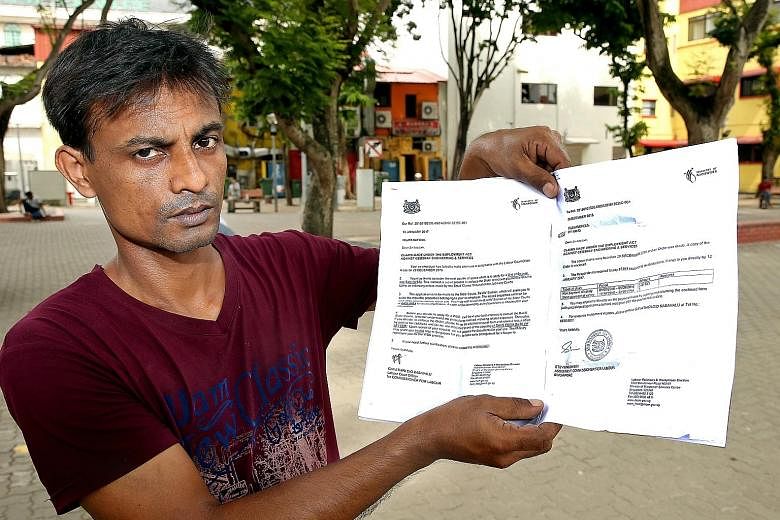Last month, a construction company boss was ordered by the Labour Court to pay a Bangladeshi construction worker $7,363 in unpaid wages.
But when the employer did not meet the payment deadline last Thursday, the court's hands were tied. Instead, the worker was asked to go to the State Courts to take action to recover the sum, a step that would require him to fork out money he does not have.
The case highlights a little- known limitation of the Labour Court, and the dilemma workers face when employers refuse to comply with its orders.
At the centre of the dispute is Mr Islam Rafiqul, a 42-year-old construction worker, and his employer Md Shamsuzzaman, sole proprietor of Geosray Engineering and Services.
Mr Islam, a work permit holder, started working for the company in February 2015, earning about $700 a month in basic salary and $1,000 a month with overtime.
He did not receive his full salary between October 2015 and June 2016. From July last year, the salary payment stopped completely.
He complained to the Ministry of Manpower (MOM) last September and was given a special pass to remain in Singapore while his salary claim was being processed. The pass prohibits him from working.
"I have not sent money home for many months," said Mr Islam, who is supporting his wife and two children, aged five and 10. MOM held meetings between Mr Islam and his employer in September and October. The employer agreed to pay, but later went back on his word.
The case then went before the Commissioner of Labour, or what is commonly called the Labour Court, which held a closed-door hearing on Dec 29.
The employer was ordered by the Labour Court to pay Mr Islam $7,363 by Jan 12. He did not.
Mr Islam met MOM officials again on Jan 13 and was told, in writing, to go to the State Courts himself to apply for a court bailiff to seize the employer's assets and auction them off to recover the unpaid wages.
He was given a letter that said the court action will cost him more than $1,000 which includes a $300 deposit, about $400 in legal fees, $50 an hour to hire a bailiff and fees to the court and auctioneer. MOM said that he had to take this route because salary recovery matters are "civil claims" .
"I was angry," said Mr Islam, who has been working here since 1998.
When contacted, Mr Shamsuzzaman said that he could not pay Mr Islam because a main contractor owed him more than $100,000.
"My company is no longer active. I am working as a delivery man now," said the Bangladesh national, who is a Singapore permanent resident.
Company records showed that the firm is registered to a shell office at International Plaza while Mr Shamsuzzaman, who is in his late 40s, lives in a Woodlands Housing Board flat.
Mr Patrick Tay, chairman of the Government Parliamentary Committee for Manpower, said enforcement of Labour Court orders can be "challenging" if employers do not comply. "Perhaps special help and relief can be provided to assist workers, especially the low-wage workers, in this respect," he suggested.
Mr Alex Au, treasurer of Transient Workers Count Too (TWC2), said the case "shows how the process can be ineffective, leaving the worker high and dry". Mr Islam had sought help from TWC2 last September.
"Singapore can reduce the incidence of such default cases by making it a criminal offence on the part of directors of companies to ignore Labour Court orders," Mr Au added.
Despite the setback, Mr Islam is still holding on to the slim hope of getting his unpaid salary.
"I have a wife and two children (to support). I cannot go home without the money," he said.


